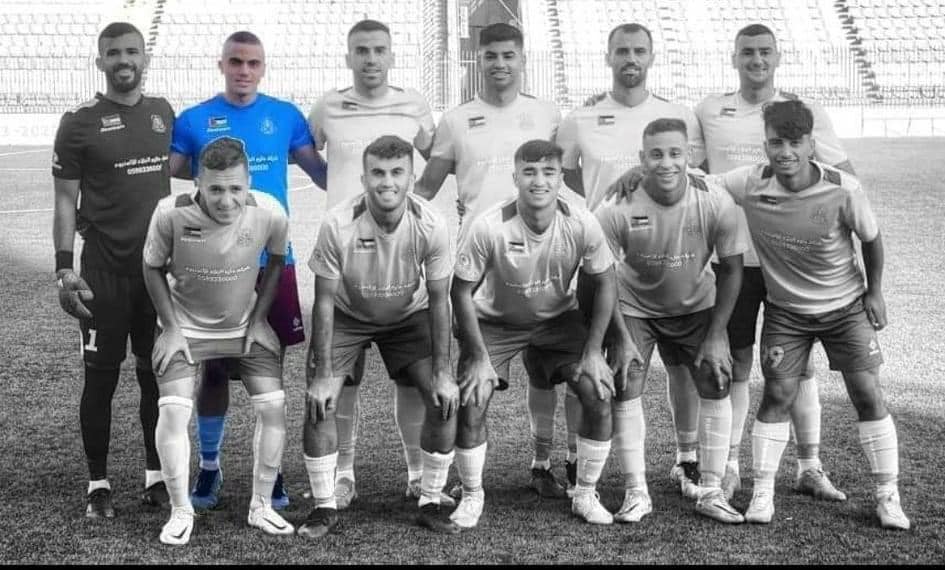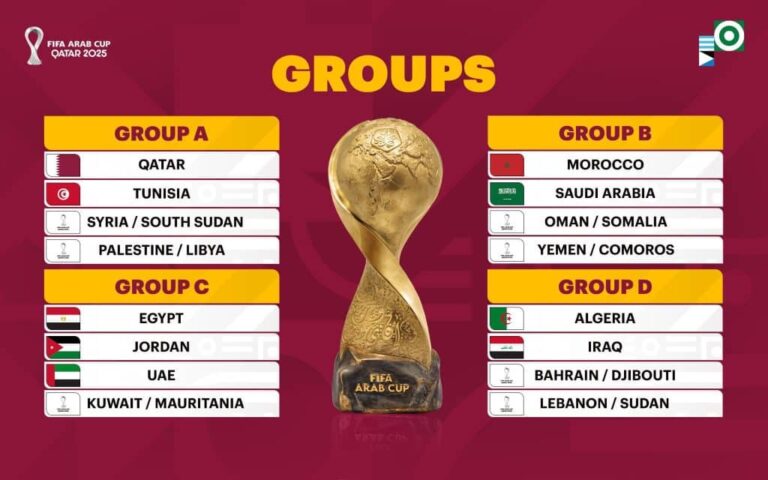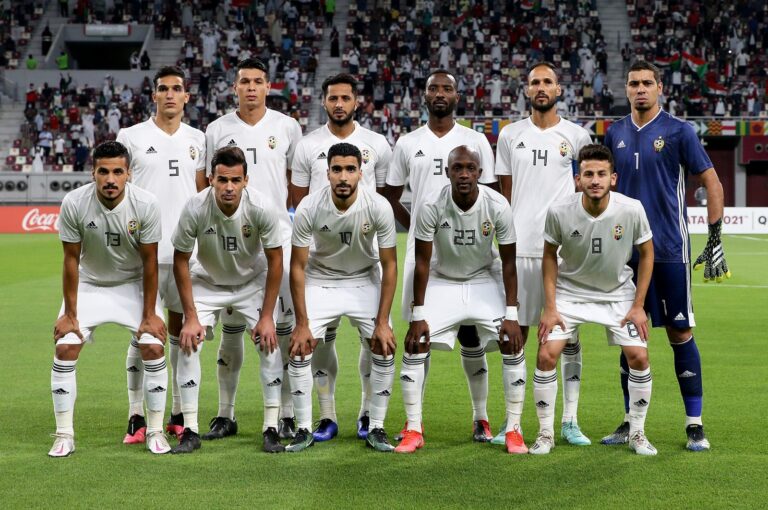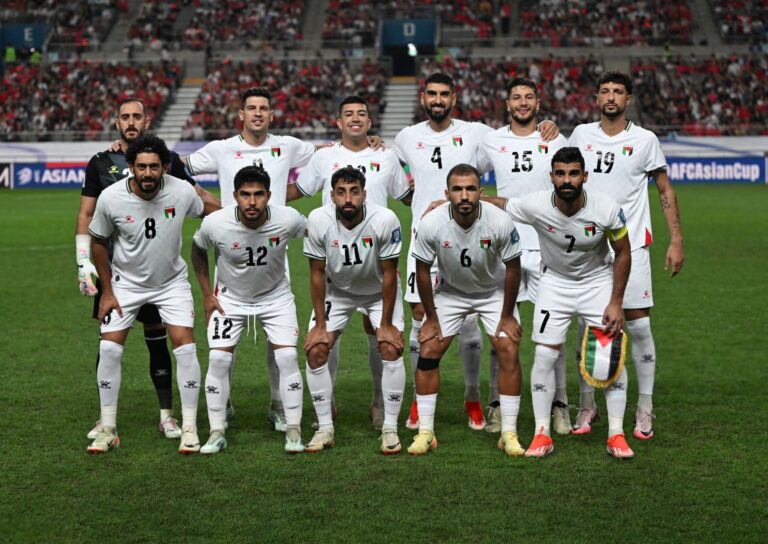It is hard to start any league review without mentioning Ahmed Daraghmeh. The 23 year old should have seen the season out with Thaqafi Tulkarem, he should have reached double digits in goals, he should have been called up to the national team, above all- he should not have been shot and killed by Israeli forces in a raid that targeted the city of Nablus on the evening December 22nd, 2022.
In the aftermath of his killing, many fans took to naming the league after him. Perhaps this will be made official and permanent in the seasons to come which would be a fitting tribute and one that will also honor the likes of Ahed Zaqout, Muath AlZaaneen, and countless other athletes that should still be with us today.
In his absence, Thaqafi Tulkarem put on a valiant display and also exhibited some fantastically technical football. The 5-3 win over Shabab Al-Dhahrieh was a fitting final fixture of the season which finally saw another Thaqafi player- Hamza Issa- overtake Daraghmeh as the team’s top scorer in 2022/23
Jabal Al-Mukaber set points record
For the second season in a row, the West Bank Premier League narrative followed that of the season before it. The eventual winners, Jabal Al-Mukaber, won their first league title since the 2009/10 season by breaking the record for most points in a season (55)- just like Shabab Al-Khaleel did the year before them.
The runners-up Hilal Al-Quds put together a campaign that mirrored that of their crosstown rivals last season. Their point total (52) was the most by a non champion breaking the unwanted record that Jabal Al-Mukaber set last season.
The big signing came through for Jabal Al-Mukaber with Rami Hamadi reducing the amount of goals conceded by the club from 24 to 15.
The goalkeeping heroics of Rami Hamadi have been amongst the league highlights for more than half a decade. The goalkeeper has now won the title with Jabal Al-Mukaber, Shabab Al-Khaleel, and Hilal Al-Quds whilst also finishing runner up with Thaqafi Tulkarem.
A particularly crucial stretch of games for Hamadi and Jabal Al-Mukaber came following the team’s first loss of the season a 2-0 loss at the hands of surprise package Shabab Al-Dhahrieh. The Jerusalem side beat Thaqafi Tulkarem 3-1 on Matchday 3, which kicked off a run of 4.5 games without conceding a goal (525 minutes).
That streak came to an end against Shabab Al-Khaleel but the extra solidity allowed Jabal Al-Mukaber to pick up the points that would make the difference on the season. In that run there were games when the attack didn’t quite click but 0-0 draws against Shabab Al-Samu’ and Merkaz Balata would prove to be crucial in the run of the season. Destiny remained in the hands of Jabal Al-Mukaber and the battle for the league was settled in four matches against holders Shabab Al-Khaleel and eventual runners-up Hilal Al-Quds which generated four wins.
Zaid Qombor proved to be an effective replacement for his brother Shehab- scoring nine goals. The aforementioned Shehab Qombor halfway through the season and whose four goals proved crucial. The always dependable Rami Musalmeh chipped in with eight goals as the team found different ways to win games.
That versatility should come in handy for the club in the 2023-24 AFC Cup next season provided they can hang on to the protagonists that delivered the club glory for the first time in over a decade.
Shabab Al-Khaleel falter in the run-in
Shabab Al-Khaleel, who had captured back-to-back league titles, were in the race until the final month of the season. A tense, drama filled match against Jabal Al-Mukaber on Matchday 19- which ended in a 1-0 loss- all but settled their quest for a third straight title. The team had succeeded last season thanks to a stingy defense that conceded a meager nine goals and although only 13 goals hit the back of their net 2022/23 the attack proved to be anemic with not a single player hitting double digit goals.
The final tally of 41 goals flatters the team somewhat who capped the season with a 6-0 win over Islami Qalqilya. A goal output of four from Tamer Seyam spelled disaster for a team with no dependable number 9 on their books. Last year a tandem of Hilal Mousa and Tamer Seyam produced over half of the team’s 41 goals. This year Mohammed Al-Jaabari was the team’s top scorer with eight, Musa Tarabin had six- but half of those came in the aforementioned 6-0 win.
Mahmoud Abu Warda, Tamer Seyam, and Abdelatif Bahdari had four apiece. The signing of Nicolas Zedan was somewhat successful as the former Palestino player found the net twice.
In spite of their third place finish, Shabab Al-Khaleel will represent Palestine in the Arab Club Championship (recently renamed the King Salman Cup) and should they be able to navigate a path past Al-Nahda (home and away matches scheduled in April/May) and a further preliminary round against the winner of Al-Ahly Tripoli v Tal’ea El-Geish they could find themselves in a group featuring giants of the game: Al-Hilal Riyadh, Al-Sadd, and Wydad Casablanca.
Coach of the Year: Amar Salman
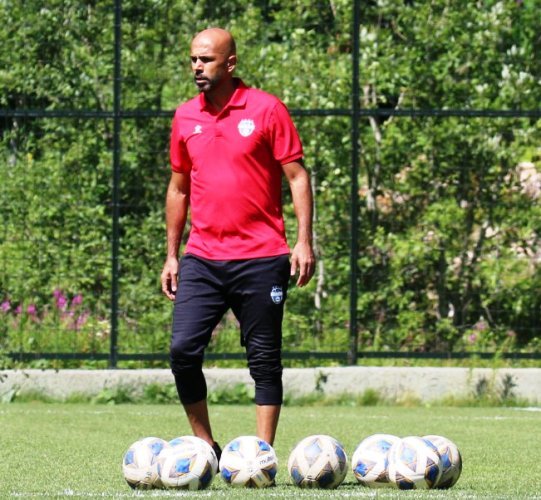
If there was an official award for coach of the season, Amar Salman, would be a near unanimous selection for the prize. The effects were already on display following his appointment in December 2021, with the team collecting 23/27 points over the last nine games of the season.
The team was expected to drop off this season after losing their attacking talismans- Mahmoud Abu Warda and Musa Tarabin to Shabab Al-Khaleel. That did not happen.
The defense was expected to leak goals after goalkeeper Mahdi Zoabi left the club. That did not happen.
A title challenge was supposed to end following the injury of their midfield dynamo Mohammed Darweesh. That did not happen.
What was also not supposed to happen was the resurrection of Mohammed ‘Hamada’ Maraaba who produced 21 goals- all from open play- over the course of the 22 game season. For reference, Maraaba had become something of a journeyman following a promising start to his career becoming the superstar signing of the sides of more modest means. He was the top scorer of the league in 2015/16 for Shabab Al-Khader (17) and again for Thaqafi Tulkarem the following season (11) before departing to Ahli Al-Khaleel and registering 9 goals in 2017/18 and a meager 5 in 2018/19. He returned to relevance after moving to Shabab Al-Am’ari in 2019/20 notching 18 goals for Shabab Al-Am’ari but then regressed over the following two seasons scoring 10 and then moving to Islami Qalqilya where he scored 7.
Maraaba was written off by many but not by Amar Salman who signed him for Hilal’s AFC Cup campaign where he scored Hilal Al-Quds’s only two goals of the tournament.
Maraaba has over 100 WBPL goals to his name over the course of his career and was only 28 at the start of the season. No player scored more goals than him in the local league but no one expected him to have this type of season. After 17 goals over the past two seasons, many wrote him off. One thing is for sure though- Hamada did not write back.
His output is down to the alchemy of Amer Salman who understood what he had and reconfigured Hilal Al-Quds’s tactics. Last season there was no focal point to the attack and goals came in from Tarabin, Abu Warda, Al-Ewesat, and Obeid. This year there was a more direct approach with midfielders looking to set Maraaba free with balls over the top.
Al-Ewesat and Obeid who had 11 goals between them last season combined for just four but were the creative forces behind many of Maraaba’s goals.
Salman also found unexpected value in a host of his other signings. Mohammed Faraj chipped in four goals from midfield after arriving from Al-Bireh while Ramzi Fakhouri was quietly competent conceding just 18 goals. Then there were the contributions of several young players Mohammed Dessouki, Mohammed Sandouqa, Samer Zubeidat, and Rasheed Shawahneh who dovetailed nicely with the veterans in the squad.
Gazelles Entertain, Enthrall
One never really knew what they were in for when Shabab Al-Dhahrieh trotted out onto the pitch. This was the only side that was able to beat the league champion in 2022/23. A win against Shabab Al-Khaleel in Match Day 16 seemed to signal their status as title challengers only for the team to then slump to a pair of 1-0 losses to Taraji Wadi Al-Nes and Shabab Al-Am’ari.
Two weeks later they beat Hilal Al-Quds to hand the title to Jabal Al-Mukaber.
In the midst of all that a trio of attacking players made Shabab Al-Dhahrieh the most entertaining team. Ali Adwi scored 15 times while the club’s captain Ahmed Maher Wridat contributed a futher six and Anas Bani Odeh continued his development chipping in seven goals whilst also orchestrating service from deeper positions. The other player to have a standout season was the left back Mohammed Yousefin who could soon parlay that form into a national team call up.
No club trio scored more than the three Green Gazelles and the attacking output is even more impressive considering the lack of a true #9.
Focus Shifts to the National Team
In 18 days time, Palestine will line up against Bahrain. It will be Palestine’s first game since June 2022 and their first friendly since September 2021. The 22 game WBPL season ended around the time it probably should (March) giving more weight to the idea of extending the season for a third round of games to take the total up to a respectable 33 games.
As mentioned several times before, Markram Dabboub probably knows the identity of half the players he wants to Qatar in January. The identity of the other 13 players is very much up in the air and contingent on how many players in the diaspora can be convinced to join the fold. The PFA has been trying hard to get John Pulskamp to make the switch from the US national team, Mustafa Zeidan and Omar Faraj who are currently part of Sweden’s B team have also been approached as have countless others.
There might be a couple of WBPL players who force themselves onto the squad for the friendly against Bahrain or for the June camp or the WAFF Championship or the recently announced Merdeka Cup. One thing is for sure, there are several uncapped WBPL players who have made a good case for their inclusion- from the more notorious Ali Adwi and Mohammed Maraaba to younger players like Mohammed Yousefin, Anas Bani Odeh, and Zaid Qombor.

